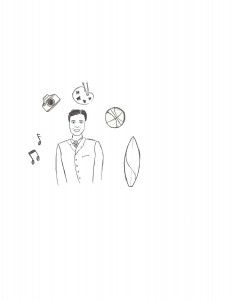 This past summer, I had an inspiring conversation during a meeting in which my presence seemed utterly inconsequential. At break, a young lady sitting next to me swiveled around in her chair and, out of the blue, asked one of the most frequent questions college students hear, “So, what do you plan to do after you graduate?” A little taken aback and quite unsure of myself, I uncomfortably smiled, gave a slight shrug and mentioned the possibility of graduate school, possibly taking a gap year beforehand to round out my work experience. She nodded, understanding my perspective, and proceeded to offer some surprisingly thought-provoking advice on a topic most professionals refrain from discussing with job-yearning undergraduates — hobbies.
This past summer, I had an inspiring conversation during a meeting in which my presence seemed utterly inconsequential. At break, a young lady sitting next to me swiveled around in her chair and, out of the blue, asked one of the most frequent questions college students hear, “So, what do you plan to do after you graduate?” A little taken aback and quite unsure of myself, I uncomfortably smiled, gave a slight shrug and mentioned the possibility of graduate school, possibly taking a gap year beforehand to round out my work experience. She nodded, understanding my perspective, and proceeded to offer some surprisingly thought-provoking advice on a topic most professionals refrain from discussing with job-yearning undergraduates — hobbies.
We all have them for entertainment purposes, and as much-needed distractions. Usually we don’t consider them as potential career material, especially under the scrutinizing question: “Well, that’s nice you enjoy sketching (or what have you), but when are you going to get a real job?” As professionals-in-training, we often feel the societal pressure to commit to an occupation typified by whitewashed cubicles, clacking keyboards and stifling business attire. This millennial fear unfortunately leaves much to be desired.
However, this insightful woman, despite what many parents and professionals fail to mention, believed there is tremendous value in pursuing hobbies as a means for both meaningful career development and self-fulfillment. She teaches spin classes at her local community fitness center several days throughout the month after work. Granted, it took commitment, but it was nevertheless a great way for her to volunteer her time and to cultivate her interpersonal skills by instructing others in a subject she personally loved, not to mention it broke up the often repetitious cycle of full-time employment.
As she explained, integrating your favorite hobby as some form of partial employment is a terrific opportunity to advance yourself in that passion and to serve others by utilizing your unique set of skills. Whether it is painting, surfing or playing an instrument or sport, seriously consider a temporary instructor position from time to time. The opportunities are out there waiting for your expertise. Additionally, matching your pastimes with community needs is a great way to stay involved, expand your network and perhaps earn a few dollars on the side.
No one says your professional career is the only means to earn a living or the terminal goal for personal success. If anything, we don’t want our hobbies to fall by the wayside because work demands so much from us. Having a few hobbies-for-hire, therefore, can distinguish you as a well-rounded individual, one who is able to strike a meaningful balance between work and personal interests and therefore manage time effectively.
This conversation brought me back to a key moment when I contemplated Pepperdine as my college of choice, as I believe it emphasizes Pepperdine’s hope for its students. At an acceptance reception, I met President Benton for the first time and expressed my enthusiasm for the university. He shook my hand saying, “If you come to Pepperdine, expect transformation. We don’t simply educate you on becoming a professional. Instead, we want you to be a professional who plays the guitar and sings in a band.” Opportunity abounds for personal growth when you can successfully integrate your career and pastimes into the community.


